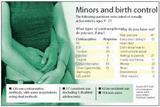
Avia Collinder, Sunday Gleaner Writer
At least 42 per cent of adolescents, ages nine to 17 years, are sexually active, with less than 30 per cent of them consistently using contraceptives, thus, exposing themselves to sexually transmitted infections and diseases, as well as unplanned pregnancies, according to a recent study.
The study, which was conducted by public policy analyst, Tazhmoye Crawford, attached to the Sir Arthur Lewis Institute of Social and Econ-omic Studies at the University of the West Indies, found that 118 of 238 sexually active minors, ages nine to 17, in 14 parishes, did not use any contraceptive method at all.
Only 57 consistently did so, while 63 respondents admitted to inconsistent use.
Contraceptive use
Crawford, a Ph.D. candidate, presented her study, entitled Access to Contraceptives by Minors in Jamaica: A Public Policy Analysis, at the Caribbean Child Research Conference on October 23 in Kingston. Her survey, which was conducted between January 2006 and September 2007, included 10 nine-year-olds, among whom the girls were provided with contra-ceptives by their parents. The sample also included five adolescents with disabilities, all of whom consistently used contraceptives.
Only a mere 25 per cent of respondents indicated that they consistently used contraceptives. Among those who used a contraception method, most used the condom, followed by coitus interruptus - pulling out prior to ejaculation.
Among the 238 sexually active adolescents surveyed, of the 120 respondents who used contraceptives - whether consistently or inconsis-tently - only 16 parents/guardians were knowledgeable about this. Four parents/guardians supplied their children - girls - with contraceptive methods.
Among the users, contraceptives were obtained mainly by the respondents themselves, friends and boyfriends. The researcher found that females faced difficulty in accessing contraceptives because of objections and abuse by health-care providers, "being asked to take their parents, being told that they are too young to have sex, or the provider expressed fear of getting in trouble".
STIs
The research showed that adolescents were more likely to use contraceptives for vaginal sex.
Among those who practised oral sex, only a very few used dental dams, which is highly recommen-ded because sexually transmitted diseases (STIs) can also be passed from one individual to the other via the mouth.
Homosexual adolescents - both male and female - used no contraceptives at all. This, the researcher said, was because they did not fear pregnancy. Female mates, she said, appeared not to know that STIs can be passed from one female to another.
Respondents were found to be more fearful of pregnancy than they were of STIs. Seventy-two of 119 females surveyed had experienced unplanned pregnancies because of unprotected sex and four had planned pregnancies.
Female respondents cited access to contraceptives as their number-one problem.
"They are turned away by pharmacists and felt uncom-fortable in clinics," Crawford noted. "In my research, access to contraceptives was more favourable to boys than to girls."

